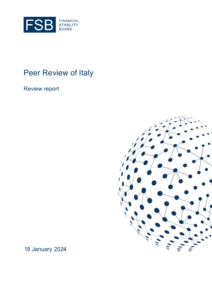Press enquiries:
+41 61 280 8477
[email protected]
Ref: 1/2024
-
Peer review reports success by the Italian authorities in reducing non-performing loans (NPLs) on bank balance sheets, developing the secondary NPL market and improving the domestic legal and institutional framework.
-
Additional steps that can be taken to improve the management of NPLs in the banking sector include maintaining a robust secondary market for NPL disposal and further improving the efficiency of insolvency, debt restructuring and enforcement.
The Financial Stability Board (FSB) today published its Peer Review of Italy. The review examines Italy’s progress to date in reducing NPLs in the banking sector.
The review finds that the Italian authorities have achieved significant success in reducing NPLs on bank balance sheets from their peak of €360 billion in December 2015 to €63 billion by June 2023. Accounting and regulatory measures; close cooperation between domestic authorities; the development of the secondary market for NPLs, including through the introduction of a government guarantee scheme on securitisation of bank bad loans; and the overhaul of in- and out-of-court restructuring and enforcement procedures contributed significantly to this success.
The review notes that further steps can be taken to preserve these achievements and continue to improve the ecosystem for managing NPLs in the banking sector. The review recommends that the Italian authorities foster the secondary market for NPLs and monitor closely and further improve the efficiency of the insolvency, debt restructuring and debt enforcement framework.
Ryozo Himino, Chair of the FSB’s Standing Committee on Standards Implementation (SCSI) that oversaw the preparation of the peer review said “The concerted efforts of the Italian authorities to tackle high NPL levels across the areas of regulation, supervision, accounting, development of a secondary market and reform of judicial processes provide a useful reference framework for other jurisdictions that may be facing similar problems in the future.”
Notes to editors
FSB member jurisdictions have committed to undergo periodic peer reviews to evaluate their adherence to international financial standards. To fulfil this responsibility, the FSB has established a regular programme of country and thematic peer reviews of its member jurisdictions. As part of this commitment, Italy volunteered to undergo a peer review in 2022-2023. The schedule of country peer reviews, as well as all completed peer review reports, is available on the FSB website.
The draft report was prepared by a team of experts from FSB member institutions and led by Makoto Minegishi, Deputy Director-General of the Financial System & Bank Examination Department at the Bank of Japan. The peer review benefited from dialogue with the Italian authorities and market participants as well as discussion in the FSB SCSI.
The FSB coordinates at the international level the work of national financial authorities and international standard-setting bodies and develops and promotes the implementation of effective regulatory, supervisory, and other financial sector policies in the interest of financial stability. It brings together national authorities responsible for financial stability in 24 countries and jurisdictions, international financial institutions, sector-specific international groupings of regulators and supervisors, and committees of central bank experts. The FSB also conducts outreach with approximately 70 other jurisdictions through its six Regional Consultative Groups.
The FSB is chaired by Klaas Knot, President of De Nederlandsche Bank. The FSB Secretariat is located in Basel, Switzerland and hosted by the Bank for International Settlements.
